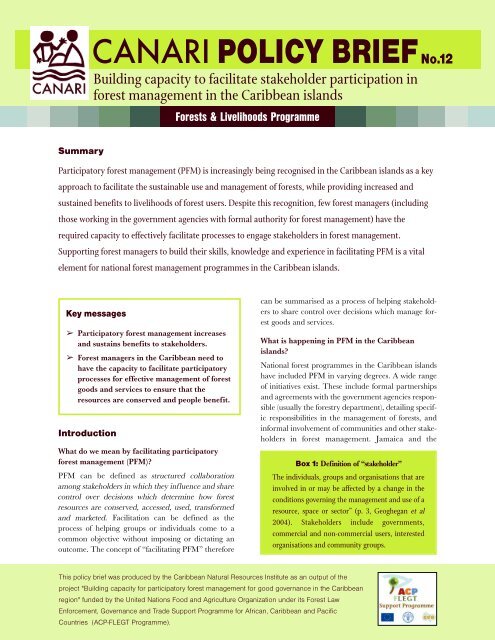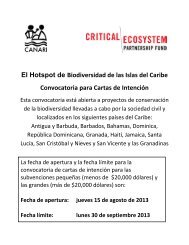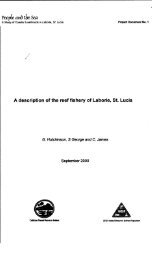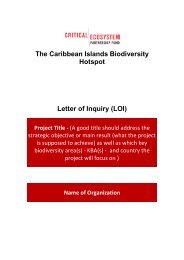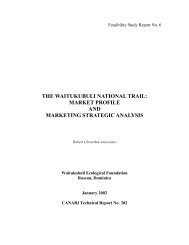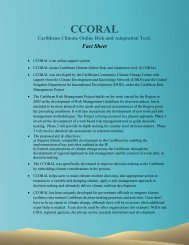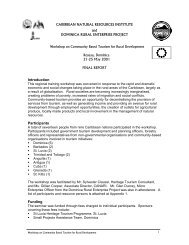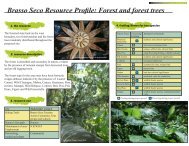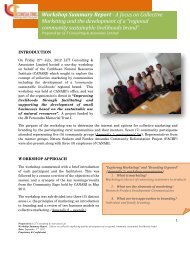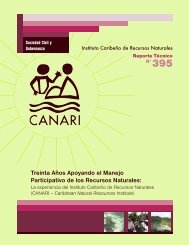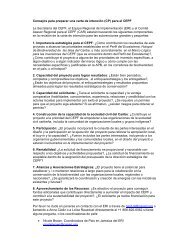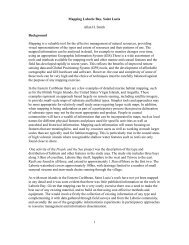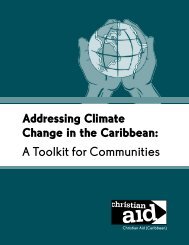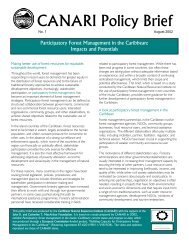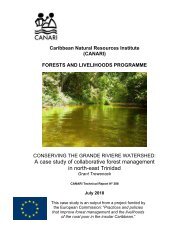Building capacity to facilitate stak - CANARI
Building capacity to facilitate stak - CANARI
Building capacity to facilitate stak - CANARI
You also want an ePaper? Increase the reach of your titles
YUMPU automatically turns print PDFs into web optimized ePapers that Google loves.
CaNaRI<br />
POLICY BRIEF<br />
<strong>Building</strong> <strong>capacity</strong> <strong>to</strong> <strong>facilitate</strong> <strong>stak</strong>eholder participation in<br />
forest management in the Caribbean islands<br />
Forests & Livelihoods Programme<br />
No.12<br />
Summary<br />
Participa<strong>to</strong>ry forest management (PFM) is increasingly being recognised in the Caribbean islands as a key<br />
approach <strong>to</strong> <strong>facilitate</strong> the sustainable use and management of forests, while providing increased and<br />
sustained benefits <strong>to</strong> livelihoods of forest users. Despite this recognition, few forest managers (including<br />
those working in the government agencies with formal authority for forest management) have the<br />
required <strong>capacity</strong> <strong>to</strong> effectively <strong>facilitate</strong> processes <strong>to</strong> engage <strong>stak</strong>eholders in forest management.<br />
Supporting forest managers <strong>to</strong> build their skills, knowledge and experience in facilitating PFM is a vital<br />
element for national forest management programmes in the Caribbean islands.<br />
Key messages<br />
➢ Participa<strong>to</strong>ry forest management increases<br />
and sustains benefits <strong>to</strong> <strong>stak</strong>eholders.<br />
➢ Forest managers in the Caribbean need <strong>to</strong><br />
have the <strong>capacity</strong> <strong>to</strong> <strong>facilitate</strong> participa<strong>to</strong>ry<br />
processes for effective management of forest<br />
goods and services <strong>to</strong> ensure that the<br />
resources are conserved and people benefit.<br />
Introduction<br />
What do we mean by facilitating participa<strong>to</strong>ry<br />
forest management (PFM)?<br />
PFM can be defined as structured collaboration<br />
among <strong>stak</strong>eholders in which they influence and share<br />
control over decisions which determine how forest<br />
resources are conserved, accessed, used, transformed<br />
and marketed. Facilitation can be defined as the<br />
process of helping groups or individuals come <strong>to</strong> a<br />
common objective without imposing or dictating an<br />
outcome. The concept of “facilitating PFM” therefore<br />
can be summarised as a process of helping <strong>stak</strong>eholders<br />
<strong>to</strong> share control over decisions which manage forest<br />
goods and services.<br />
What is happening in PFM in the Caribbean<br />
islands?<br />
National forest programmes in the Caribbean islands<br />
have included PFM in varying degrees. A wide range<br />
of initiatives exist. These include formal partnerships<br />
and agreements with the government agencies responsible<br />
(usually the forestry department), detailing specific<br />
responsibilities in the management of forests, and<br />
informal involvement of communities and other <strong>stak</strong>eholders<br />
in forest management. Jamaica and the<br />
Box 1: Definition of “<strong>stak</strong>eholder”<br />
The individuals, groups and organisations that are<br />
involved in or may be affected by a change in the<br />
conditions governing the management and use of a<br />
resource, space or sec<strong>to</strong>r” (p. 3, Geoghegan et al<br />
2004). Stakeholders include governments,<br />
commercial and non-commercial users, interested<br />
organisations and community groups.<br />
This policy brief was produced by the Caribbean Natural Resources Institute as an output of the<br />
project "<strong>Building</strong> <strong>capacity</strong> for participa<strong>to</strong>ry forest management for good governance in the Caribbean<br />
region" funded by the United Nations Food and Agriculture Organization under its Forest Law<br />
Enforcement, Governance and Trade Support Programme for African, Caribbean and Pacific<br />
Countries (ACP-FLEGT Programme).
Box 2: Definition of “forest manager”<br />
Forest managers facilitating a session on mapping<br />
relationships among <strong>stak</strong>eholders at Blue and John Crow<br />
Mountain National Park in Jamaica.<br />
Dominican Republic have established formal mechanisms<br />
for community participation in forest management.<br />
Many other countries do not have formal mechanisms<br />
but they all offer a favourable policy environment<br />
for PFM. These include countries that are signa<strong>to</strong>ry<br />
<strong>to</strong> multilateral environmental agreements that<br />
recommend consultative and participa<strong>to</strong>ry approaches<br />
and countries that are implementing projects with<br />
PFM.<br />
Is there <strong>capacity</strong> <strong>to</strong> <strong>facilitate</strong> PFM?<br />
Individuals or organisations involved in guiding the<br />
effective use of forests (directly or indirectly for<br />
example through work in policy influence,<br />
sustainable livelihoods, education) including<br />
government agencies with responsibility for<br />
managing forests (e.g. environmental management<br />
departments, protected area departments) as well<br />
as non-governmental organisations (NGOs),<br />
community-based organisations (CBOs), the<br />
private sec<strong>to</strong>r (e.g. consultants) and academia”.<br />
Although PFM is included in some national forest programmes,<br />
the <strong>capacity</strong> <strong>to</strong> <strong>facilitate</strong> PFM in the region<br />
is weak 1 . Jamaica has the only national forest programme<br />
in the region with two trained “Rural<br />
Sociologists” - professionals who are dedicated <strong>to</strong> helping<br />
communities residing near forests <strong>to</strong> participate in<br />
management. Despite the efforts of some forestry<br />
departments <strong>to</strong> provide in-house <strong>capacity</strong> building<br />
and organisations like <strong>CANARI</strong> that provide training<br />
and men<strong>to</strong>ring, and notable efforts by some foresters<br />
<strong>to</strong> individually build their capacities and <strong>to</strong> men<strong>to</strong>r<br />
others, professional foresters in forest departments are<br />
generally not exposed <strong>to</strong> formal training in PFM facilitation.<br />
There are few opportunities for professional<br />
development in this area. Further, foresters in the<br />
region have increasingly recognised that for PFM <strong>to</strong><br />
work, a wider cadre of forest managers other than government<br />
personnel need <strong>to</strong> have the <strong>capacity</strong> <strong>to</strong> <strong>facilitate</strong><br />
PFM.<br />
What are the benefits of PFM?<br />
Forest managers assisting villagers of Colihaut with group<br />
work on <strong>stak</strong>eholder analysis at Syndicate Visi<strong>to</strong>r Center<br />
in Dominica.<br />
Contributes <strong>to</strong> building consensus on controversial<br />
issues<br />
During 2007 <strong>to</strong> 2010, the Government of Trinidad<br />
and Tobago contracted <strong>CANARI</strong> as an independent<br />
facilita<strong>to</strong>r in the participa<strong>to</strong>ry development of a<br />
national forest policy and a protected areas policy.<br />
During the initial stages of development of these policies,<br />
six controversial issues were identified. <strong>CANARI</strong><br />
drafted one page summaries of each of the issues and<br />
included a few questions on each sheet <strong>to</strong> encourage<br />
analysis and negotiation. These sheets were used <strong>to</strong><br />
generate recommendations in <strong>facilitate</strong>d focus group<br />
discussions which were further refined in separate<br />
meetings with key <strong>stak</strong>eholders. The end result was a<br />
1<br />
See http://canari.org/forestmanagement.asp for detailed analysis of national policy frameworks for PFM in the English-speaking Caribbean
projects geared <strong>to</strong> improving livelihoods. Participants<br />
reported that the sessions highlighted the importance<br />
of the groups meeting regularly <strong>to</strong> coordinate activities<br />
and assisted them in projecting a clear voice <strong>to</strong> the<br />
government on how forest resources should be managed<br />
<strong>to</strong> support sustainable forest-based livelihoods.<br />
Forest manager facilitaing a session <strong>to</strong> evaluate a workshop<br />
<strong>to</strong> create a plan for building partnerships <strong>to</strong> support<br />
development of community <strong>to</strong>urism livelihoods in Colihaut,<br />
Dominica with villagers.<br />
high level of consensus on some very challenging<br />
issues for forest management.<br />
Identifies opportunities <strong>to</strong> enhance livelihoods<br />
The islands of St. Vincent and the Grenadines experienced<br />
wide scale flooding and land slippage after<br />
intense rains in April 2011. The Orange Hill<br />
Development Organisation had been managing two<br />
small projects geared at improving livelihoods but<br />
because of the flooding challenge, funding for forestbased<br />
livelihood projects was redirected. Forest managers<br />
<strong>facilitate</strong>d a session with members of the CBO<br />
which identified strategies for improving or maintaining<br />
their forest-based livelihoods during the period of<br />
recovery when external support was suspended.<br />
Builds the <strong>capacity</strong> of civil society organisations<br />
The Co-operative Development Division Office of the<br />
Government of Dominica, the Dominica Beekeepers<br />
Co-operative Society Ltd. (DBCS) and the Pure<br />
Blossom Co-operative Society Ltd. (PBCS) <strong>facilitate</strong>d<br />
a session <strong>to</strong> build the <strong>capacity</strong> of DBCS for PFM. One<br />
of the key outcomes was that participants felt that they<br />
were now more aware of the rights, roles and responsibilities<br />
of key <strong>stak</strong>eholders which would help them <strong>to</strong><br />
make better decisions about the design and implementation<br />
of projects <strong>to</strong> improve forest-based livelihoods.<br />
Gives voice <strong>to</strong> civil society organisations<br />
During the establishment of a Local Forest<br />
Management Committee (LFMC) in the Morant<br />
Riverside Watershed Management Unit, Jamaica, forest<br />
managers <strong>facilitate</strong>d a session with <strong>stak</strong>eholders<br />
from surrounding villages who were implementing<br />
Promotes awareness on forest management issues<br />
Forest officers from Saint Lucia’s Forestry<br />
Department <strong>facilitate</strong>d sessions <strong>to</strong> guide the establishment<br />
of a management committee for the Millet Bird<br />
Sanctuary and Nature Trail. Two years had passed<br />
since the formulation of a management plan for the<br />
area and the representatives of key organisations had<br />
changed. The new representatives were not familiar<br />
with the project and found the sessions were useful in<br />
describing the situation on the ground and in helping<br />
them <strong>to</strong> gain a better understanding of the context in<br />
which the Sanctuary is <strong>to</strong> be managed.<br />
What are challenges <strong>to</strong> doing PFM?<br />
Capacity <strong>to</strong> <strong>facilitate</strong><br />
Key capacities for a facilita<strong>to</strong>r of participa<strong>to</strong>ry processes<br />
include:<br />
• having, or being perceived <strong>to</strong> have, a neutral perspective<br />
so that all views can be equitably considered<br />
and that negotiation among different interests<br />
can be achieved;<br />
• having a world view and philosophy that places<br />
people at the heart of development, and respects<br />
and values the contributions of all people;<br />
• possessing a culture and focus that are process-oriented<br />
and not solely interested in the results of the<br />
process;<br />
• being responsive and able <strong>to</strong> adapt the process <strong>to</strong><br />
respond <strong>to</strong> emerging needs and interests;<br />
• having advanced skills in communication (particularly<br />
listening skills), negotiation and conflict management;<br />
• having knowledge about the theory and practice of<br />
participa<strong>to</strong>ry planning and management, with relevant<br />
examples of real life application;<br />
• knowledgeable about the local context, including<br />
an understanding of the natural ecosystems, management<br />
systems, legal and policy framework, and<br />
the <strong>stak</strong>eholders.
Capacity <strong>to</strong> participate<br />
Effective participation requires that all <strong>stak</strong>eholders<br />
involved have the <strong>capacity</strong> <strong>to</strong> participate.<br />
Organisations as well as individuals need the <strong>capacity</strong><br />
<strong>to</strong> participate. Capacity encompasses a range of elements<br />
(world view/philosophy, culture, structure,<br />
adaptive culture and strategies, linkages, skills, knowledge<br />
and abilities and material resources) which need<br />
<strong>to</strong> be considered collectively.<br />
Time<br />
Participa<strong>to</strong>ry processes require identification and<br />
mobilisation of <strong>stak</strong>eholders, communication among<br />
them, and often debate and negotiation (and sometimes<br />
conflict management) before a decision can be<br />
reached by consensus. This is an iterative process and<br />
demands adequate time <strong>to</strong> <strong>facilitate</strong> <strong>stak</strong>eholder<br />
engagement and <strong>to</strong> enable adaptation <strong>to</strong> the changing<br />
situation. Limited time can correspondingly limit the<br />
effectiveness or depth of participation.<br />
What can I do?<br />
➢ Advocate for and support PFM approaches that<br />
ensure that <strong>stak</strong>eholders equitably share control<br />
over decisions which manage forest goods and<br />
services.<br />
➢ Insist on having independent and skilled facilita<strong>to</strong>rs<br />
when engaging in participa<strong>to</strong>ry processes.<br />
➢ Support <strong>capacity</strong> building (training, exchange visits,<br />
action research and learning projects) of forest<br />
managers for facilitating participa<strong>to</strong>ry forest management.<br />
➢ Support and pilot the development and implementation<br />
of projects, plans, policies, and legislation <strong>to</strong><br />
create the enabling environment for facilitation of<br />
participa<strong>to</strong>ry forest management.<br />
References<br />
Geoghegan, T., Y. Renard & N.A. Brown. 2004.<br />
Guidelines for Participa<strong>to</strong>ry Planning: A Manual for<br />
Caribbean Natural Resource Managers and<br />
Planners. Caribbean Natural Resources Institute<br />
Guidelines Series 4. Port of Spain: <strong>CANARI</strong>.<br />
Other <strong>CANARI</strong> publications that may be<br />
of interest <strong>to</strong> you:<br />
• <strong>CANARI</strong>. 2002. Assessing Capacity for<br />
Participa<strong>to</strong>ry Natural Resource<br />
Management. <strong>CANARI</strong> Guidelines Series<br />
No 3. Laventille: <strong>CANARI</strong>.<br />
• <strong>CANARI</strong>. 2004. Guidelines for Stakeholder<br />
Identification and Analysis:A Manual for<br />
Caribbean Natural Resource managers and<br />
Planners. <strong>CANARI</strong> Guidelines Series No 5.<br />
Laventille: <strong>CANARI</strong>.<br />
• <strong>CANARI</strong> 2010 Community participation in<br />
natural resource management: lessons from<br />
Caribbean small island states. <strong>CANARI</strong><br />
Issues Paper No 1. Laventille: <strong>CANARI</strong>.<br />
Caribbean Natural Resources Institute<br />
The Caribbean Natural Resources Institute<br />
(<strong>CANARI</strong>) is a regional technical non-profit<br />
organisation which has been working in the islands of<br />
the Caribbean for over 20 years.<br />
Our mission is <strong>to</strong> promote and <strong>facilitate</strong> equitable<br />
participation and effective collaboration in the<br />
management of natural resources critical <strong>to</strong><br />
development in the Caribbean islands, so that people<br />
will have a better quality of life and natural resources<br />
will be conserved, through action learning and<br />
research, <strong>capacity</strong> building and fostering partnerships.<br />
For more information please contact:<br />
Caribbean Natural Resources Institute (<strong>CANARI</strong>)<br />
Fernandes Industrial Centre<br />
<strong>Building</strong> 7, Eastern Main Road,<br />
Laventille, Trinidad. W.I.<br />
Tel: (868) 626-6062 • Fax: (868) 626-1788<br />
Email: info@canari.org • Website: www.canari.org


